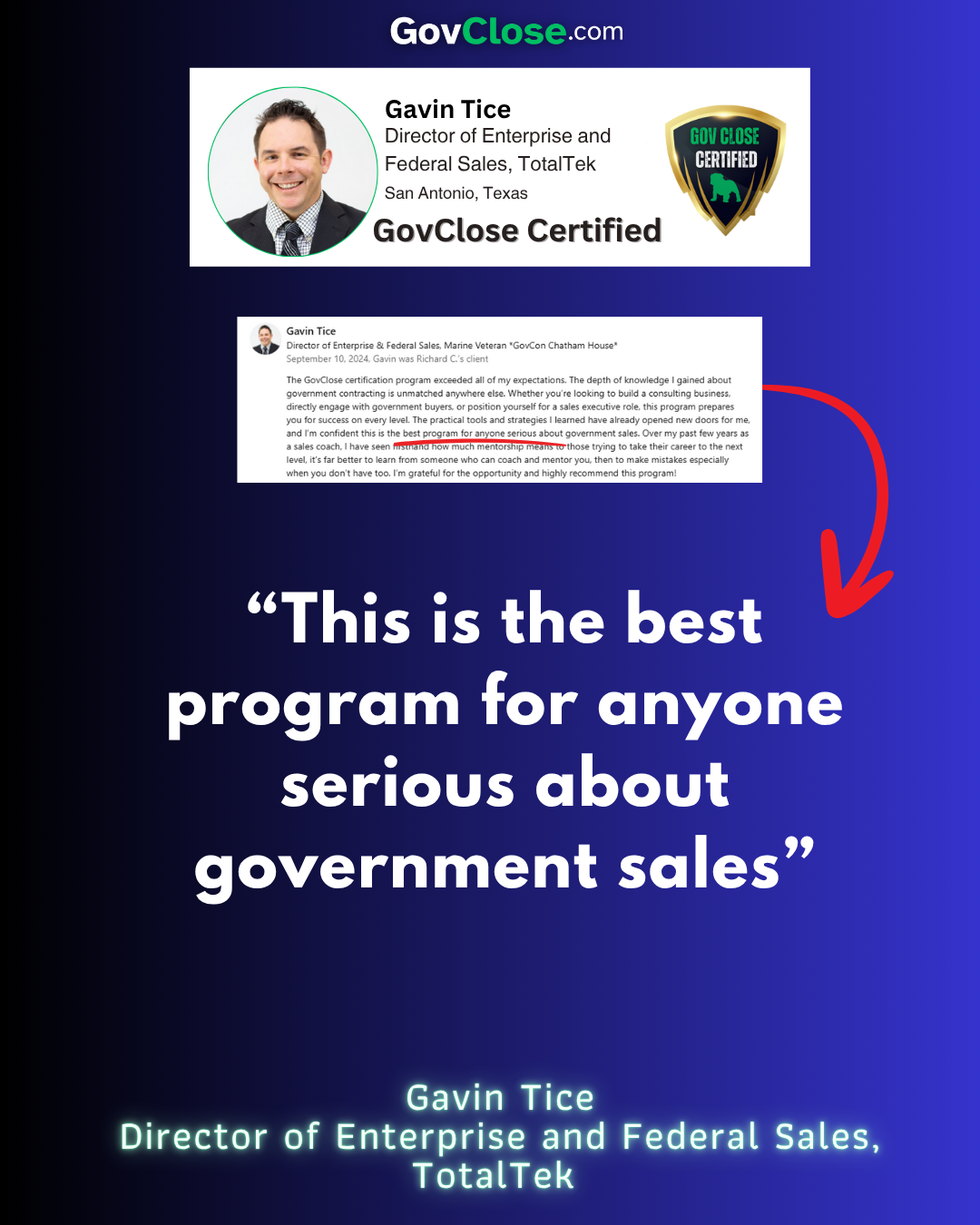The 15 Rules of Making Money with SAM.gov (Explained by a Former Government Acquisitions Officer)
Nov 19, 2025If there’s one thing I’ve learned after spending years as a government acquisitions officer—and later training hundreds of business owners—it's this: government contracting is absolutely worth it, but it is not easy.
Every day, I meet entrepreneurs who are excited about selling to the U.S. government, the world’s largest buyer of goods and services. And yet, only a tiny percentage of small businesses ever break into this space, and even fewer actually thrive in it.
Why?
Because most people underestimate what it really takes to succeed.
In one of my most comprehensive videos to date, I break down the 15 essential rules I wish every new contractor understood before jumping into federal contracting or creating a SAM.gov account. These rules come directly from my experience managing over $82 billion in government contracts and from helping thousands of students, consultants, and small businesses navigate this world through my Gov Close training platform.
This blog is the full written deep dive.
Rule #1–3: Government Contracting Is Hard — and Persistence Matters More Than Anything
I always start with this truth: selling to the government is hard.
Not impossible. Not mysterious. Just hard.
And that’s a good thing.
If winning government contracts were easy, everyone would be doing it—and competition would be brutal. Instead, it rewards the people who stay consistent, stay patient, and stay focused when everyone else gives up.
The government moves slowly.
Procurements take time.
Stakeholders change.
Budgets shift.
On average, it takes 12 to 18 months to win your first contract. If you’re expecting fast money or instant ROI, you’ll burn out before you begin. You need persistence, grit, and the willingness to keep going even when it feels like nothing is happening.
Just like Calvin Coolidge said:
Nothing in the world can take the place of persistence.
Federal contracting lives and breathes that truth.
Rule #4–7: Specialize, Focus, and Avoid the Middleman Trap
One of the biggest mistakes beginners make is trying to sell everything.
The government loves specialists—not generalists. And they absolutely do not reward “middlemen” who try to match solicitations with subcontractors but bring no real value.
Let me be very clear:
The middleman model does not work in federal contracting.
The FAR (Federal Acquisition Regulation) requires the prime contractor to perform meaningful work and take full responsibility for the contract’s success. If you don't actually do the work, you’re setting yourself up for legal issues, financial losses, and a terrible reputation.
Instead, follow the principle I call the law of specificity:
👉 Sell one clearly defined product or service
👉 Master one niche
👉 Become known for one solution
When you narrow your focus, everything gets easier:
-
Identifying agencies that buy what you sell
-
Understanding the competition
-
Building past performance
-
Crafting better proposals
-
Winning faster
Generalists write proposals that sound vague.
Specialists write proposals that sound like guaranteed success.
Rule #8: Use Data to Confirm the Government Actually Buys What You Sell
This is where most companies waste time: they chase opportunities without confirming whether the government even buys their product or service.
Before you EVER pursue federal contracting, you should look up your NAICS and PSC codes on:
-
USAspending.gov
-
SAM.gov Data Bank
-
Agency Forecasts
I teach my students how to pull spending trends over 5–7 years, filter the data for small business awards, and identify top agency buyers. This is how you validate whether your niche is viable.
Data doesn’t lie.
And when used correctly, it prevents you from building your business on guesswork.
Rule #9–10: Build a Real Business With Real Value
You can’t skip steps.
You can’t bypass experience.
You can’t show up on SAM.gov with no past performance and expect agencies to hand you contracts.
That’s simply not how the government operates.
Government contracting is an extension of a real business, not a side hustle. Agencies want to see:
-
3–5 years of proven performance
-
Real customers
-
Real operations
-
Real capability
Federal contracts are high-risk obligations. The government isn’t gambling on a company that’s still figuring itself out.
Before you go “government,” your business must already:
-
Deliver consistent results
-
Understand its niche
-
Have clear pricing
-
Have processes and teams in place
Once you have a stable business foundation, government contracting becomes one of the most profitable expansion paths out there.
Rule #11–12: Certifications Help — But They Don’t Win Deals For You
There are several important small business certifications, including:
-
8(a)
-
HUBZone
-
WOSB (Women-Owned Small Business)
-
SDVOSB (Service-Disabled Veteran-Owned Small Business)
These are valuable. They open doors. They can drastically reduce competition.
But one misconception I hear constantly is:
“If I get certified, the contracts will come to me.”
No.
Certifications are only multipliers on top of capability.
If you already deliver value and understand your market, certifications grease the wheels. If you don’t have real services, past performance, or focus—certifications won’t save you.
Of all the certifications, SDVOSB currently has some of the strongest advantages due to VA and DoD policies—but again, value beats status every time.
Rule #13–14: Know the Acquisition Process and Get Involved Before the RFP Drops
Most of the real action in federal contracting happens before you ever see a solicitation on SAM.gov.
Let me say that again:
👉 The companies that win most contracts are shaping them during the market research phase—long before they hit SAM.gov.
During market research, the government:
-
Tests the market
-
Asks for capability insights
-
Evaluates small business availability
-
Determines whether set-asides are possible
-
Refines requirements
If you’re actively engaging in industry days, RFIs, and sources-sought notices, you can directly influence:
-
The contract requirements
-
The evaluation criteria
-
The set-aside category
-
The acquisition strategy
This is where small businesses gain competitive advantage.
When the RFP finally drops, you shouldn’t be surprised—you should already know it’s coming.
Rule #15: Winning Is Just the Beginning — Execution Is Where the Money Is Made
Too often, people think the contract award is the finish line.
It’s not. It’s the starting line.
Once the contract begins, the government expects:
-
Strict compliance
-
Excellent delivery
-
Consistent reporting
-
Contract management discipline
If you stumble here, you won’t survive long in the federal space.
Government contracting isn’t just a sales opportunity—it’s an operational commitment. You need:
-
Experienced project managers
-
Strong communication
-
A clear understanding of FAR
-
The ability to work with contracting officers
This is why many companies hire consultants or join training programs like Gov Close—not just to win contracts, but to manage them profitably.
The Bottom Line: Government Contracting Works — If You Work It Correctly
These 15 rules form the foundation of everything I teach at Gov Close.
Federal contracting is complex, regulated, and slow-moving—but for business owners who stay focused, build real value, and invest in the process, it becomes one of the most stable, scalable, and lucrative business models in the world.
I’ve watched small businesses:
-
Go from struggling to million-dollar revenue
-
Win multi-year contracts that created generational stability
-
Pivot into consulting roles earning six figures helping others
-
Build niche products that the government buys year after year
The opportunity is real.
But the commitment has to be real, too.
If you’re serious about government contracting, learn the rules, stay persistent, specialize deeply, and put in the work long before your first RFP. It’s not fast money. It’s not easy money. But it is good money.
And with the right approach, the federal marketplace can change your business—and your life.
👉 Learn more about starting your consulting business at GovClose.com
👉Get Weekly Government Contracting Business Tips: https://federalytics.substack.com
👉 Explore the GovClose Certification Program for step-by-step training
👉 Follow me on LinkedIn for free live training and Q&A
Turn Government Contracting Knowledge Into Income
This isn’t a course. It’s a certification and implementation system to help you build a consulting business, land a high-paying sales role, or scale your own company in federal contracting.
We hate SPAM. We will never sell your information, for any reason.


